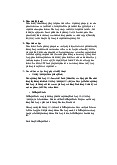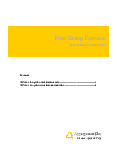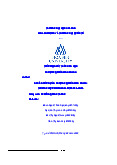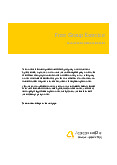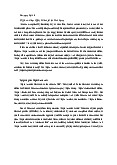












Preview text:
Y VAN NGUYEN FORECAST
1. Bộ đề Forecast IELTS Speaking Quý 4/2022 – Part 1 Cinemas
1. Did you go to the cinema/movies a lot when you were a child? (Why/Why not?)
2. Do you still like the same films/movies that you liked when you were a child?
3. Do you prefer to go to the cinema/movies with friends or on your own? (Why/Why not?) Weather
1. What’s the weather like in your country each season?
2. What type of weather do you like best?
3. Does the weather ever affect what you do?
4. Does it rain a lot in your hometown?
5. Does rain ever affect transportation in your hometown? Transport
1. What form of transport do you prefer to use? Why?
2. How often do you take buses?
3. Can you compare the advantages of planes and trains? Snacks 1. Do you like snacks?
2. What kinds of snacks are popular in your country?
3. Do you think eating snacks is good for your health? Birthday
1. What do you usually do on your birthdays?
2. What kinds of birthday gifts do you like to receive?
3. How do people often celebrate birthdays in your country? Advertisements
1. Where can you see advertisements?
2. Do you want to be shown in the advertisement?
3. What kind of advertisements do you dislike?
4. Have you ever bought something because of its advertisement? Social network
1. What kinds of social networking websites do you like to use?
2. Do you use social networking sites?
3. What kind of people do you like to be friends with on those websites? 1 Y VAN NGUYEN FORECAST
Home & Accommodation
1. Do you live in a house or a flat?
2. Can you describe the place where you live?
3. How long have you lived there?
4. Please describe the room you live in
5. What part of your home do you like the most? 6. Who do you live with?
7. What room does your family spend most of the time in?
8. What do you usually do in your flat?
9. What kinds of accommodation do you live in? Writing
1. Do you often write with your hand(s)?
2. Do you prefer handwriting or typing on the computer?
3. Would you say that having good handwriting is important? Hometown 1. Where is your hometown?
2. Is that a big city or a small place? 3. Do you like your hometown?
4. What do you like (most) about your hometown?
5. Is there anything you dislike about it?
6. How long have you been living there? 7. Do you like living there?
8. Do you think you will continue living there for a long time?
9. Please describe your hometown a little.
10. What’s your hometown famous for?
11. Did you learn about the history of your hometown at school? Meeting places
1. Where is your favorite place to meet with your friends?
2. Do you think there are some places more suitable for meeting with others?
3. Are there any differences between your favorite meeting places in the
present and in your childhood?
4. Why are some meeting places better than others? Old buildings
1. Have you ever seen some old buildings in the city?
2. Do you think we should preserve old buildings in cities’
3. Do you prefer living in an old building or a modern house?
4. Are there any old buildings you want to see in the future? Why? Sitting down
1. Where is your favorite place to sit?
2. Do you always sit down for a long time? 2 Y VAN NGUYEN FORECAST
3. Do you feel sleepy when you are sitting down?
4. When you were a kid. did you usually sit on the floor? Talents
1. Do you have a talent or something you are good at?
2. Was it mastered recently or when you were young?
3. Do you think your talent can be useful for your future work? Why?
4. Do you think anyone in your family has the same talent? Watch 1. Do you wear a watch?
2. Have you ever got a watch as a gift?
3. Why do some people wear expensive watches?
4. Do you think it is important to wear a watch? Why? Work or studies
1. What subject are you studying? 2. Do you like your subject?
3. Why did you choose to study that subject? 4. Is it very interesting?
5. Do you prefer to study in the mornings or in the afternoons?
6. Are you looking forward to working?
7. What technologies do you use when you study? 8. What works do you do?
9. Why did you choose to do that type of work (or that job)? 10. Do you like your job? 11. Is it very Interesting?
12. Do you miss being a student’
13. What technologies do you use at work?
14. Who helps you the most? And how? Name 1. Who gave you your name?
2. Does your name have any particular (or, special) meaning? 3. Do you like your name?
4. In your country, do people feel that their names are very important?
5. Are there many Vietnamese people who have the same name as you? Cars
1. Did you enjoy travelling by car when you were a child? (Why/Why not?)
2. Would you generally prefer to be a driver or a passenger in a car? (Why/Why not?)
3. How important is the color of a car to you? (Why/Why not?)
4. What type of car would you most like to have in the future? (Why/Why not?) Websites 3 Y VAN NGUYEN FORECAST
1. What kinds of websites do you use most often? (Why/Why not?)
2. Do you prefer to get information from websites or books? (Why/Why not?)
3. Does your favorite website look the same now as when you first used it? (Why/Why not?)
4. Which is more important to you, what a website looks like or how easy it is to use? (Why?) Watching Sports/Sports
1. Do you enjoy watching sport on TV? (Why/Why not?)
2. Have you ever been to watch a live sports event (e.g., in a stadium)? (Why/Why not?)
3. Is there a sports event you might like to watch in the future? (Why/Why not?)
4. Do you think it’s more enjoyable to watch sports alone or with other people? 5. Do you like sports?
6. Did you learn sports when you were a child? 7. Why is sport important? History
1. Do you like to learn about history?
2. What historical event do you find interesting?
3. Do you think history is important?
4. Do you consider archaeology to be an important science? Sweets & Cakes 1. Do you like to eat sweets?
2. Do you like sweets more or less now compared to when you were child? 3. Is
there any sweet food in your country?
3. Do you eat cakes or sweets after a meal? Evening time
1. Do you like the morning or evening?
2. What do you usually do in the evening?
3. What did you do in the evening when you were little? Why’
4. Are there any differences between what you do in the evening now and what you did in the past? Boring things
1. What will you do when you feel bored?
2. What kind of things are boring to you?
3. Whom do you think get bored easily, the young or the old? 4. Do you think school is boring? Stress
1. What stress do people usually face?
2. Why do people who work feel stressed and don’t just quit their jobs? Puzzles 4 Y VAN NGUYEN FORECAST
1. Did you do puzzles in your childhood?
2. When do you do puzzles, during a trip or when you feel bored?
3. Do you like doing word puzzles or number puzzles? Which is more difficult for you?
4. Do you think it is good for old people to do puzzles? Cooking
1. What are some of the things that you can cook? 2. Do you like cooking? 3. How often do you cook?
4. What dishes are you best at cooking?
5. Does anyone in your family like to cook? Geography 1. Do you like geography?
2. Have you ever studied geography at school?
3. Are you good at reading a map?
4. Would you visit a country because of its geographical location? The area you live in
1. Do you like the area that you live in?
2. Where do you like to go in that area?
3. Do you know any famous people in your area?
4. What are some changes in the area recently? 5.
Bộ đề Forecast IELTS Speaking Quý 4/2022 – Part 2 & 3 Đề s ố 1
Part 2: Describe a person you follow regularly on social media or other media. You should say: 1. Who he/she is 2. How you knew him/her
3. What he/she posts on social media
4. And explain why you follow him/her on social media Part 3:
1. What can people do on social media?
2. Do you think older people and younger people will use the same kind of social media software?
3. Do older people spend much time on social media?
4. Are non-social media like television and newspapers still useful? 5 Y VAN NGUYEN FORECAST Đề s ố 2
Part 2: Describe a person you know who does a job which is useful to society. You should say: 1. Who this person is 2. How you knew him/her
3. What type of work he/she does
4. And explain why you think his/her work is useful to the society Part 3: 1. What jobs are well-paid?
2. What are the changes in working conditions?
3. What are the impacts of the epidemic on the work environment? Đề s ố 3
Part 2: Describe an occasion when somebody said something positive about some work that you did. You should say: 1. Who it was 2. What work it was 3. When she/he told you that
4. And explain how you felt when hearing it Part 3:
1. Will you be affected when hearing a number of negative stories?
2. How will you react when someone pays you a compliment?
3. Why are negative feedbacks as important as positive feedbacks at work? Đề s ố 4
Part 2: Describe a place you have visited that you would recommend as a good place to live. You should say: 1. Where it was
2. How you felt when you were there
3. And explain why you would love to live there Part 3 6 Y VAN NGUYEN FORECAST
1. If you had a chance to live anywhere in the world, where would it be?
2. What are good qualities of a good place? Đề s ố 5
Part 2: Describe a time when someone asked you for your opinion. You should say: 1. When she/he asked you
2. How she/he felt while listening to your opinion
3. And explain why she/he needed your opinion Part 3:
1. Have you ever asked someone for his/her opinion?
2. Why do some people react impolitely when listening to someone’s story? Đề s ố 6
Part 2: Describe a time you used your cellphone/ smartphone to do something important. You should say: 1. What happened 2. When it happened
3. How important the cellphone/smartphone was
4. And explain how you felt about the experience Part 3:
1. What do you usually do with a cellphone?
2. What are the differences between young people and old people when using a cellphone?
3. Which one is more important, using a cellphone to make phone calls or to read messages?
4. Do you think there should be a law to stop people from making phone calls in public? Đề s ố 7
Part 2: Describe a city you would recommend as a nice place to live (not your hometown). You should say: 7 Y VAN NGUYEN FORECAST 1. What it is 2. Where it is
3. What you know about this place
4. And explain why you recommend it as a nice place to live Part 3:
1. Where do people like to live in your country?
2. Why do many people move to the city?
3. What are the advantages of living close to the workplace?
4. What kinds of places do older people prefer to live in? Đề s ố 8
Part 2: Describe an important river/lake in your country. You should say: 1. Where it is located 2. How big/long it is 3. What it looks like
4. And explain why it is important Part 3:
1. How can rivers and lakes benefit local people?
2. Do you think rivers and lakes attract tourists?
3. How do rivers and lakes affect local tourism?
4. Are rivers and lakes good for transport? Why? Đề s ố 9
Part 2: Describe an interesting neighbor. You should say: 1. Who he/she is 2. How you knew him/her 3. What you do together
4. And explain why he/she is interesting Part 3:
1. Do you think people are familiar with their neighbors?
2. How can people improve the relationship with neighbors in a community?
3. How do children build relationships with others in a community?
4. Is it beneficial to get along well with neighbors? 8 Y VAN NGUYEN FORECAST Đề s ố 10
Part 2: Describe something you do that can help you concentrate on work/study. You should say: 1. What it is
2. How it helps you concentrate 3. When you do it
4. And explain how you feel about it Part 3:
1. Why is it more difficult for children to concentrate nowadays than in the past?
2. Do you think technology will harm children’s ability to concentrate?
3. What kinds of jobs require high concentration at work?
4. Can exercise help people improve concentration? Đề s ố 11
Part 2: Describe a time when you were very busy. You should say: 1. When it happened 2. Where you were 3. What you did
4. And explain why you were busy Part 3:
1. Do you like to be always busy?
2. What are the advantages and disadvantages when people keep busy?
3. Do you think children should learn through playing games or under pressure?
4. What kind of pressure people may experience at work? Đề s ố 12
Part 2: Describe a popular/well-known person in your country. You should say: 1. Who this person is 2. What he/she has done 3. Why he/she is popular
4. And explain how you feel about this person Part 3: 9 Y VAN NGUYEN FORECAST
1. What kinds of people are popular at work?
2. Are bosses more popular than employees at work?
3. Which one is more important, keeping a good relationship with colleagues or doing well at work?
4. What benefits are there when a child is popular at school? Đề s ố 13
Part 2: Describe a friend you enjoy talking with. You should say: 1. Who is he/she
2. How long you two are friends 3. What you do together
4. And explain why she/he is your best friend Part 3:
1. Is it better to communicate face to face or online? Why?
2. Do you think it is impossible to make real friends on the internet?
3. Why is it hard to maintain friendships for some people?
4. What do you think it takes to become friends?
5. What do you talk about with your friends?
6. Do you think you can be friends with strangers?
7. How should you treat a stranger? Đề s ố 14
Part 2: Describe a difficult decision you made that had a very good result. You should say: 1. What decision it was
2. What difficulties you faced how you made the decision
3. And explain why it was a difficult decision. Part 3:
1. What decisions do people usually make in their daily lives?
2. Which is easier making a decision by yourself or making a decision after group discussion?
3. Why are many young people unwilling to follow their parents’ advice? Đề s ố 15
Part 2: Describe a time when someone asked for your opinion. 10
